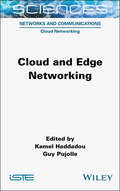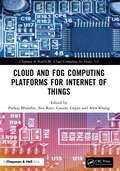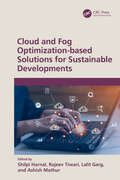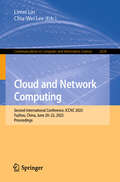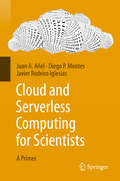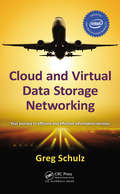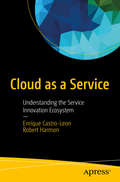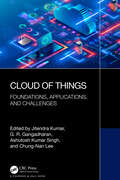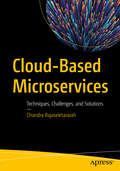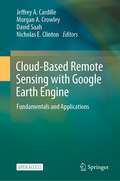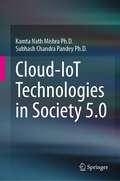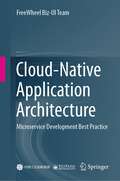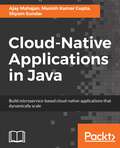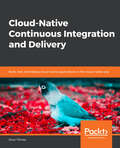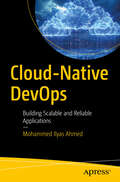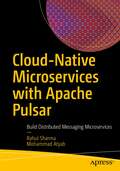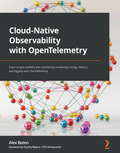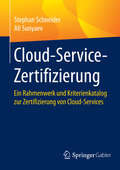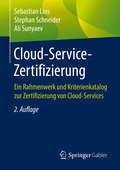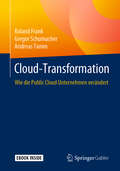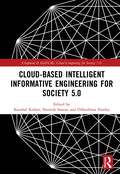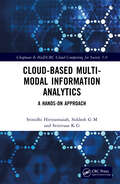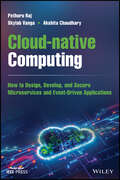- Table View
- List View
Cloud and Edge Networking
by Guy Pujolle Kamel HaddadouA major transformation in the world of networks is underway, as the focus shifts from physical technology to software-based solutions. In this book, the authors present this new generation of networks that are based in the Cloud by detailing the transition from a complex environment to a simple digital infrastructure. This infrastructure brings together connected devices, the antennas that collect radio waves, the optical fibers that carry signals and the data center that handles all of the different processes. From this perspective, the data center becomes the brain, managing network services, controls, automation, intelligence, security and other applications. This architecture is relevant to carrier networks, the Internet of Things, enterprise networks and the global networks of the major Internet companies. Cloud and Edge Networking further discusses developments at the border of networks, the Edge, where data is processed as near as possible to the source. Over the next ten years, the Edge will become a major strategic factor.
Cloud and Fog Computing Platforms for Internet of Things (Chapman & Hall/CRC Cloud Computing for Society 5.0)
by Gaurav Gupta Alex Khang Pankaj Bhambri Sita RaniToday, relevant data are typically delivered to cloud-based servers for storing and analysis in order to extract key features and enable enhanced applications beyond the basic transmission of raw data and to realize the possibilities associated with the impending Internet of Things (IoT). To allow for quicker, more efficient, and expanded privacy-preserving services, a new trend called Fog Computing has emerged: moving these responsibilities to the network's edge. Traditional centralized cloud computing paradigms confront new problems posed by IoT application growth, including high latency, limited storage, and outages due to a lack of available resources. Fog Computing puts the cloud and IoT devices closer together to address these issues. Instead of sending IoT data to the cloud, the fog processes and stores it locally at IoT devices. Unlike the cloud, fog-based services have a faster reaction time and better quality overall. Fog Computing, Cloud Computing, and their connectivity with the IoT are discussed in this book, with an emphasis on the advantages and implementation issues. It also explores the various architectures and appropriate IoT applications. Fog Computing, Cloud Computing, and Internet of Things are being suggested as potential research directions. Features: A systematic overview of the state-of-the-art in Cloud Computing, Fog Computing, and Internet of Things Recent research results and some pointers to future advancements in architectures and methodologies Detailed examples from clinical studies using several different data sets
Cloud and Fog Optimization-based Solutions for Sustainable Developments
by Rajeev Tiwari Lalit Garg Shilpi Harnal Ashish MathurCloud and Fog Optimization-based Solutions for Sustainable Developments discusses the integration of fog computing and the Internet of Things to provide scalable, secure, and cost-effective digital infrastructures for smart services in diverse domains: Highlights resource management solutions for the Internet of Things devices in fog computing architectures Discusses waste management using cloud and fog computing for sustainable development, and optimization of the Internet of Things in fog computing for fault tolerance Covers smart surveillance and monitoring using cloud and fog computing, and energy-efficient smart healthcare Explains energy-efficient frameworks for cloud-fog environments for sustainable development, and smart grid infrastructure using cloud and fog computing Presents the management of metropolitan mobility for public transport and smart vehicles with cloud and fog computing The text is primarily written for senior undergraduates, graduate students, and academic researchers in the fields of electrical engineering, electronics and communications engineering, computer science and engineering, and information technology.
Cloud and Network Computing: Second International Conference, ICCNC 2025, Fuzhou, China, June 20–22, 2025, Proceedings (Communications in Computer and Information Science #2539)
by Chia-Wei Lee Limei LinThis book constitutes the proceedings of the Second International Conference on Cloud and Network Computing, ICCNC 2025, which was held in Fuzhou, China, during June 20–22, 2025. The 31 full papers presented in this volume were carefully reviewed and selected from 88 submissions. They are grouped into the following topics: Cloud & Edge Computing; Network Computing; Big Data Analysis and Artificial Intelligence; Security & Privacy.
Cloud and Serverless Computing for Scientists: A Primer
by Juan A. Añel Diego P. Montes Javier Rodeiro IglesiasThis book offers an introduction to cloud computing and serverless computing for students, researchers and R&D organizations through several practical examples. Rather than focusing exclusively on the computational issues related to cloud computing, the authors focus on addressing the multidisciplinary applications of cloud computing for daily research work in public institutions and private companies in fields such as archaeology, geosciences, computer sciences, medicine and physics. The book also discusses the emergence of serverless computing over the last three years as a means to make computational infrastructures more apparent to users, avoiding the need to concern one's self with the type of server or computing machine needed to perform a computing task. These topics are presented from the perspective of users, researchers and decision-makers, and are approached based on the authors' collective experience on the use and adoption of cloud computing.
Cloud and Virtual Data Storage Networking
by Greg SchulzThe amount of data being generated, processed, and stored has reached unprecedented levels. Even during the recent economic crisis, there has been no slow down or information recession. Instead, the need to process, move, and store data has only increased. Consequently, IT organizations are looking to do more with what they have while supporting gr
Cloud as a Service: Understanding the Service Innovation Ecosystem
by Enrique Castro-Leon Robert HarmonSee how the principles of Service Science govern the dynamics driving the adoption of cloud computing in the industry.Cloud as Service shows you how the evolution of enterprise computing platforms to application-specific cloud platforms (ASCPs) have aligned to business needs. You'll also learn processes for developing and building ASCPs. You'll gain insight into how executives, managers, and technologists are utilizing cloud services, cloud service providers, equipment manufacturers, and software and application vendors participating in cloud supply chains.For business, the appeal of cloud computing must go beyond the notion of convenient, on-demand access of networked pooled access to computing resources. Industry leaders have learned to apply cloud computing to become more nimble, cost effective, and customer engaging as they strive for competitive advantage, regardless of size. These companies define and build cloud platforms customized for their needs rather than using someone else’s. This book shows you how to use a holistic, end-to-end view of platform planning, platform development, supply chains and operations to collapse platform development times to a fraction of the original time. You’ll see that strategies for selling to the cloud market are essentially incomplete; and that in order to be successful, businesses must become cloud service businesses themselves, incorporating cloud technologies in their engineering, IT, sales and marketing, and delivery processes. What You'll Learn:Historical perspective to provide insight into the dynamics driving cloud evolution todayState of the art in IT requirements and cloud solutionsThe value of User Experience (UX) driven design principlesThe crucial roles of Service Brokers and Service Assurance ManagersThe landscape of emerging cloud services and what they mean to your enterpriseService Portals and Enterprise Service BusesWho This Book Is For:CIOs, CTOs, data center architects, solution architects and application engineers Educational institutions building a systems integration curriculum Developers who want to understand how their work fits in the cloud ecosystem
Cloud of Things: Foundations, Applications, and Challenges
by G. R. Gangadharan Jitendra Kumar Ashutosh Kumar Singh Chung-Nan LeeCloud computing is the on-demand availability of computer system resources, especially data storage and computing power, without direct active management by the user. This book explores algorithms, protocols, and system design principles of key smart technologies including cloud computing and the internet of things.• Discusses the system design principles in cloud computing along with artificial intelligence, machine learning, and data analytics applications• Presents blockchain-based solutions, cyber-physical system applications, and deep learning approaches to solving practical problems• Highlights important concepts including the cloud of things architecture, cloud service management and virtualization, and resource management techniques• Covers advanced technologies including fog computing, edge computing, and distributed intelligence• Explores cloud-enabling technology, broadband networks and internet architecture, internet service providers (ISPs), and connectionless packet switching.The book is primarily written for graduate students, academic researchers, and professionals in the field of computer science and engineering, electrical engineering, and information technology.
Cloud-Based Cyber-Physical Systems in Manufacturing
by Lihui Wang Xi Vincent WangThis book presents state-of-the-art research, challenges and solutions in the area of cloud-based cyber-physical systems (CPS) used in manufacturing. It provides a comprehensive review of the literature and an in-depth treatment of novel methodologies, algorithms and systems in the area of architecture design, cyber security, process planning, monitoring and control. The book features detailed descriptions of how to derive solutions in a cloud environment where physical machines can be supported by cyber decision systems when engaged in real operations. It presents a range of novel ideas and is characterized by a balanced approach in terms of scope vs. depth and theory vs. applications. It also takes into account the need to present intellectual challenges while appealing to a broad readership, including academic researchers, practicing engineers and managers, and graduate students. Dedicated to the topic of cloud-based CPS and its practical applications in manufacturing, this book benefits readers from all manufacturing sectors, from system design to lifecycle engineering and from process planning to machine control. It also helps readers to understand the present challenges and future research directions towards factories of the future, helping them to position themselves strategically for career development.
Cloud-Based Design and Manufacturing (CBDM): A Service-Oriented Product Development Paradigm for the 21st Century
by Dirk SchaeferThe book introduces the reader to game-changing ways of building and utilizing Internet-based services related to design and manufacture activities through the cloud. In a broader sense, CBDM refers to a new product realization model that enables collective open innovation and rapid product development with minimum costs through social networking and negotiation platforms between service providers and consumers. It is a type of parallel and distributed system consisting of a collection of inter-connected physical and virtualized service pools of design and manufacturing resources as well as intelligent search capabilities for design and manufacturing solutions. Practicing engineers and decision makers will learn how to strategically position their product development operations for success in a globalized interconnected world.
Cloud-Based Microservices: Techniques, Challenges, and Solutions
by Chandra RajasekharaiahUse this field guide as you transform your enterprise to combine cloud computing with a microservices architecture.The recent surge in the popularity of microservices in software development is mainly due to the agility it brings and its readiness for the cloud. The move to a microservices architecture on the cloud involves a gradual evolution in software development. Many enterprises are embarking on this journey, and are now looking for architects who are experienced in building microservices-based applications in the cloud. A master architect should be able to understand the business, identify growth hurdles, break a monolith, design microservices, foresee problems, overcome challenges, change processes, decipher CSP services, strategize cloudification, adopt innovations, secure microservices, prototype solutions, and envision the future. Cloud-Based Microservices provides you with the information you need to be successful in such an endeavor. What You Will Learn Be familiar with the challenges in microservices architecture and how to overcome themPlan for a cloud-based architectureArchitect, build, and deploy microservices in the cloudKnow how security, operations, and support change in this architecture Who This Book Is For Engineers, architects, and those in DevSecOps attempting to move their enterprise software to take advantage of microservices and the cloud and be more nimble
Cloud-Based Remote Sensing with Google Earth Engine: Fundamentals and Applications
by Jeffrey A. Cardille Morgan A. Crowley David Saah Nicholas E. ClintonThis book guides its audience—which can range from novice users to experts— though a 55-chapter tour of Google Earth Engine. A sequenced and diverse set of lab materials, this is the product of more than a year of effort from more than a hundred individuals, collecting new exercises from professors, undergraduates, master’s students, PhD students, postdocs, and independent consultants. Cloud Based Remote Sensing with Google Earth Engine is broadly organized into two halves. The first half, Fundamentals, is a set of 31 labs designed to take the reader from being a complete Earth Engine novice to being a quite advanced user. The second half, Applications, presents a tour of the world of Earth Engine across 24 chapters, showing how it is used in a very wide variety of settings that rely on remote-sensing data This is an open access book.
Cloud-IoT Technologies in Society 5.0
by Kamta Nath Mishra Ph.D. Subhash Chandra Pandey Ph.D.This book provides in-depth knowledge in the areas of convergence of cloud-IoT technologies and industry 4.0 with society 5.0, machine-to-machine communication, machine-to-person communication, techno-psychological perspective of society 5.0, sentiment analysis of smart digital societies, multi-access edge computing for 5G networks, discovery & location reporting of multi-access edge enabled clients/servers, m-health systems, enhancing the concert of M-health technologies in smart societies, supervising communication services in smart societies, life quality enhancement in smart city societies, multiple disease infection predictions, and societal opinion mining algorithms for smart cities societies using cloud-IoT integrated intelligent machine / deep learning technologies to the readers in the distributive environment. In this book, the authors have mandatorily discussed the implementation of cloud-IoT based machine learning technologies like clustering technique, Naïve Bayes classifier, artificial neural network (ANN), Firefly algorithm, Rough set classifiers, support vector machine classifier, decision tree classifier, ensemble classifier, random forest, and deep learning algorithms to analyze the behavior of intelligent machines and human habits using automated data scheduling and smart digital networks.At present, we live in a self-motivated and dynamic global society where technologies and challenges are unexpectedly changing overnight. These rapid changes in globalization and technological advances are creating new market forces every day. Therefore, day-to-day innovation is essential for any business or institution to survive and flourish in such an atmosphere. Though, innovation is no longer just to create value to do good to individuals, societies, or organizations. The utmost purpose of innovation is to create a smart futuristic society where people can enjoy the best quality of life using natural resources and manmade technologies including cloud-IoT technologies, and industry 4.0. Hence, the innovators and their innovations must search for intelligent solutions to tackle major socio-technical problems and remove barriers of rural, urban and smart city societies.The smart digitization and intelligent implementation of manufacturing development processes are the necessities for today’s rural, urban, and smart city industries. All types of industries including development, manufacturing, and research are presently shifting from bunch production to customized production. The fast advancements in manufacturing technologies have an in-depth impact on all types of societies including societies of rural areas, urban areas, and smart cities. Industry 4.0 includes the Internet of Things (IoT), Industrial Internet, Smart Manufacturing, Cloud-based computing, and Manufacturing Technologies. The objective of this book is to establish linkage between the Industry 4.0 components and various rural, urban & smart city societies (including society 5.0) to bring actual prosperity where human values, peace of mind, human relations, man-machine-relations, and calmness will have utmost preference. These objectives can be achieved by the integration of human societal values, and social opinion mining (SOM) approaches with the existing technologies.
Cloud-Native Application Architecture: Microservice Development Best Practice
by FreeWheel Biz-UI TeamThe authors of this book explore a way to build cloud-native microservice applications, based on years of practice. Presenting a range of real-world scenarios, from design, development, and testing to deployment, the book shows how teams can leverage cloud-native technologies to develop applications, covering the full lifecycle. Further, it consistently combines theory and practice, and comprehensively analyzes how to implement core cloud-native technologies such as container, service mesh, serverless, continuous integration, and deployment. Given its scope, the book offers a valuable asset for all architects, engineers, and technological decision-makers with an interest in microservices and cloud-native technologies.
Cloud-Native Applications in Java: Build microservice-based cloud-native applications that dynamically scale
by Shyam Sundar Ajay Mahajan Munish Kumar GuptaHighly available microservice-based web apps for Cloud with Java Key Features Take advantage of the simplicity of Spring to build a full-fledged application Let your applications run faster while generating smaller cloud service bills Integrate your application with various tools such as Docker and ElasticSearch and use specific tools in Azure and AWS Book Description Businesses today are evolving so rapidly that they are resorting to the elasticity of the cloud to provide a platform to build and deploy their highly scalable applications. This means developers now are faced with the challenge of building build applications that are native to the cloud. For this, they need to be aware of the environment, tools, and resources they’re coding against. If you’re a Java developer who wants to build secure, resilient, robust, and scalable applications that are targeted for cloud-based deployment, this is the book for you. It will be your one stop guide to building cloud-native applications in Java Spring that are hosted in On-prem or cloud providers - AWS and Azure The book begins by explaining the driving factors for cloud adoption and shows you how cloud deployment is different from regular application deployment on a standard data centre. You will learn about design patterns specific to applications running in the cloud and find out how you can build a microservice in Java Spring using REST APIs You will then take a deep dive into the lifecycle of building, testing, and deploying applications with maximum automation to reduce the deployment cycle time. Gradually, you will move on to configuring the AWS and Azure platforms and working with their APIs to deploy your application. Finally, you’ll take a look at API design concerns and their best practices. You’ll also learn how to migrate an existing monolithic application into distributed cloud native applications. By the end, you will understand how to build and monitor a scalable, resilient, and robust cloud native application that is always available and fault tolerant. What you will learn See the benefits of the cloud environment when it comes to variability, provisioning, and tooling support Understand the architecture patterns and considerations when developing on the cloud Find out how to perform cloud-native techniques/patterns for request routing, RESTful service creation, Event Sourcing, and more Create Docker containers for microservices and set up continuous integration using Jenkins Monitor and troubleshoot an application deployed in the cloud environment Explore tools such as Docker and Kubernetes for containerization and the ELK stack for log aggregation and visualization Use AWS and Azure specific tools to design, develop, deploy, and manage applications Migrate from monolithic architectures to a cloud native deploymentWho this book is for Java developers who want to build secure, resilient, robust and scalable applications that are targeted for cloud based deployment, will find this book helpful. Some knowledge of Java, Spring, web programming and public cloud providers (AWS, Azure) should be sufficient to get you through the book.
Cloud-Native Continuous Integration and Delivery: Build, Test, And Deploy Cloud-native Applications In The Cloud-native Way
by Onur YilmazThis course is ideal for professionals interested in cloud-native software development. To benefit the most from this course, you must be familiar with developing, building, testing, integrating, and deploying containerized microservices into cloud systems.
Cloud-Native DevOps: Building Scalable and Reliable Applications
by Mohammed Ilyas AhmedThis book delivers cloud-based applications that are both scalable and reliable, aligning with the evolving needs of the present user base. This innovative approach blends the agility of cloud computing with the efficiency of contemporary DevOps methodologies. The book starts by providing valuable insights into the ever-evolving software landscape of Cloud-native DevOps. It delves into strategies for crafting scalable and dependable applications and illustrates the art of leveraging open-source tools to enhance collaboration. It navigates through the integral role of microservices in contemporary software development and imparts the know-how to integrate them with DevOps practices. The book simplifies container technology, with a focus on Docker and Kubernetes. It further elucidates the process of streamlining software delivery through Continuous Integration and Continuous Deployment (CI/CD). As you progress, you will explore open-source tools, including Argo, Kubeflow Pipelines, and AWS Step Functions. The concluding section covers real-world case studies and best practices for implementing Cloud-native DevOps. The book reviews the core concepts covered throughout and provides an exciting glimpse into the future of Cloud-native DevOps. Upon completing this book, you will be well-versed in the principles and practices of Cloud-native DevOps, understand real-world applications, and recognize the critical importance of security in cloud computing. What You Will Learn Create cloud-based applications that can scale with the changing needs of today's user base Combine the flexibility of cloud computing with the efficiency of modern DevOps methodologies Understand the core concepts and principles of Cloud-native DevOps Understand microservices, containers, and continuous integration and continuous deployment (CI/CD) Who This Book Is For DevOps engineers, cloud architects, software developers, system administrators, IT managers, team leads, and business decision makers
Cloud-Native Microservices with Apache Pulsar: Build Distributed Messaging Microservices
by Rahul Sharma Mohammad AtyabApply different enterprise integration and processing strategies available with Pulsar, Apache's multi-tenant, high-performance, cloud-native messaging and streaming platform. This book is a comprehensive guide that examines using Pulsar Java libraries to build distributed applications with message-driven architecture.You'll begin with an introduction to Apache Pulsar architecture. The first few chapters build a foundation of message-driven architecture. Next, you'll perform a setup of all the required Pulsar components. The book also covers work with Apache Pulsar client library to build producers and consumers for the discussed patterns. You'll then explore the transformation, filter, resiliency, and tracing capabilities available with Pulsar. Moving forward, the book will discuss best practices when building message schemas and demonstrate integration patterns using microservices. Security is an important aspect of any application; the book will cover authentication and authorization in Apache Pulsar such as Transport Layer Security (TLS), OAuth 2.0, and JSON Web Token (JWT). The final chapters will cover Apache Pulsar deployment in Kubernetes. You'll build microservices and serverless components such as AWS Lambda integrated with Apache Pulsar on Kubernetes. After completing the book, you'll be able to comfortably work with the large set of out-of-the-box integration options offered by Apache Pulsar. What You'll LearnExamine the important Apache Pulsar components Build applications using Apache Pulsar client librariesUse Apache Pulsar effectively with microservicesDeploy Apache Pulsar to the cloudWho This Book Is ForCloud architects and software developers who build systems in the cloud-native technologies.
Cloud-Native Observability with OpenTelemetry: Learn to gain visibility into systems by combining tracing, metrics, and logging with OpenTelemetry
by Charity Majors Alex BotenLeverage OpenTelemetry's API, libraries, tools and the collector to produce and collect telemetry along with using open-source tools to analyze distributed traces, check metrics and logs, and gain insights into application healthKey FeaturesGet to grips with OpenTelemetry, an open-source cloud-native software observability standardUse vendor-neutral tools to instrument applications to produce better telemetry and improve observabilityUnderstand how telemetry data can be correlated and interpreted to understand distributed systemsBook DescriptionCloud-Native Observability with OpenTelemetry is a guide to helping you look for answers to questions about your applications. This book teaches you how to produce telemetry from your applications using an open standard to retain control of data. OpenTelemetry provides the tools necessary for you to gain visibility into the performance of your services. It allows you to instrument your application code through vendor-neutral APIs, libraries and tools.By reading Cloud-Native Observability with OpenTelemetry, you'll learn about the concepts and signals of OpenTelemetry - traces, metrics, and logs. You'll practice producing telemetry for these signals by configuring and instrumenting a distributed cloud-native application using the OpenTelemetry API. The book also guides you through deploying the collector, as well as telemetry backends necessary to help you understand what to do with the data once it's emitted. You'll look at various examples of how to identify application performance issues through telemetry. By analyzing telemetry, you'll also be able to better understand how an observable application can improve the software development life cycle.By the end of this book, you'll be well-versed with OpenTelemetry, be able to instrument services using the OpenTelemetry API to produce distributed traces, metrics and logs, and more.What you will learnUnderstand the core concepts of OpenTelemetryExplore concepts in distributed tracing, metrics, and loggingDiscover the APIs and SDKs necessary to instrument an application using OpenTelemetryExplore what auto-instrumentation is and how it can help accelerate application instrumentationConfigure and deploy the OpenTelemetry CollectorGet to grips with how different open-source backends can be used to analyze telemetry dataUnderstand how to correlate telemetry in common scenarios to get to the root cause of a problemWho this book is forThis book is for software engineers, library authors, and systems operators looking to better understand their infrastructure, services and applications by leveraging telemetry data like never before. Working knowledge of Python programming is assumed for the example applications that you'll be building and instrumenting using the OpenTelemetry API and SDK. Some familiarity with Go programming, Linux, and Docker is preferable to help you set up additional components in various examples throughout the book.
Cloud-Service-Zertifizierung: Ein Rahmenwerk und Kriterienkatalog zur Zertifizierung von Cloud-Services
by Stephan Schneider Ali SunyaevDie Auslagerung von Services in die Cloud ist mit Risiken verbunden. Dieses Buch liefert ein Rahmenwerk zur Zertifizierung von Services in der Cloud. Herzstück dabei ist ein umfangreicher Kriterienkatalog zum Assessment von Cloud-Services. Dabei wendet sich das Buch an Cloud-Service-Anwender und unterstützt bei der Bewertung, dem Vergleich und der Auswahl von Angeboten. Gerade in kritischen Bereichen wie Sicherheit, Verfügbarkeit und Vertragsfragen unterstützt der Katalog bei der Definition von eigenen Anforderungen. Das Buch eignet sich jedoch auch für Cloud-Service-Anbieter, die es zum Self-Assessment und zur Verbesserung der eigenen Services nutzen können. Das Buch fasst eines der Ergebnisse des dreijährigen Forschungsprojekts ,,Value4Cloud" zusammen, das im Rahmen des Technologieprogramms ,,Trusted Cloud" vom Bundesministerium für Wirtschaft und Technologie gefördert wurde. Es liefert mit 219 Zertifizierungskriterien und einem Zertifizierungsrahmenwerk einen wichtigen Beitrag zum Assessment von Cloud-Services und der Verbesserung von Cloud-Service-Zertifizierungen.
Cloud-Service-Zertifizierung: Ein Rahmenwerk und Kriterienkatalog zur Zertifizierung von Cloud-Services
by Stephan Schneider Ali Sunyaev Sebastian LinsDieses Buch liefert ein Rahmenwerk zur Zertifizierung von Services in der Cloud. Herzstück dabei ist ein umfangreicher Kriterienkatalog zum Assessment von Cloud-Services, der im Forschungsprojekt „Value4Cloud“ , gefördert vom Bundesministerium für Wirtschaft und Technologie, entwickelt wurde. Cloud-Service-Anwender werden bei der Bewertung, dem Vergleich und der Auswahl von Services unterstützt. Das Buch eignet sich auch für Cloud-Service-Anbieter zum Self-Assessment und zur Verbesserung der eigenen Services.
Cloud-Transformation: Wie die Public Cloud Unternehmen verändert
by Roland Frank Gregor Schumacher Andreas TammIn diesem Buch lernen Sie, wie die Public Cloud die Kostenstrukturen von digitalen Geschäftsmodellen und damit bestehende Märkte signifikant verändert. Die Zusammenhänge zwischen den verwendeten Cloud-Architekturen, der Organisation des Unternehmens und den dadurch möglichen Preis- und Geschäftsmodellen werden übersichtlich und für den Einsatz im eigenen Unternehmen nutzbar aufbereitet.Die Autoren erläutern, wie der Reihe nach immer mehr Märkte zu digitalen Märkten werden und welche Rolle die Grenzkosten dabei spielen. Sie beschreiben, wie die cloudbasierte IT die klassische IT disruptiert. Dadurch können kleine Teams mit geringen Investitionen weltweit skalierende Geschäftsmodelle zu Null-Grenzkosten aufbauen. Die wirtschaftlichen Effekte werden anhand konkreter Beispiele nachvollziehbar dargestellt. Zusätzlich erhalten technische Laien einen Überblick, welche Faktoren für die Wettbewerbsfähigkeit ihrer digitalen Geschäftsmodelle besonders wichtig sind und wie Manager diese beeinflussen können. Zum Abschluss gibt das Buch Praktikern einen konkreten Leitfaden an die Hand, wie die Cloud-Transformation im Unternehmen durchgeführt werden kann. Das Buch richtet sich vor allem an Führungskräfte und Mitarbeiter in den Fachbereichen und der IT, die die Cloud-Transformation in ihren Unternehmen vorantreiben möchten.
Cloud-based Intelligent Informative Engineering for Society 5.0 (Chapman & Hall/CRC Cloud Computing for Society 5.0)
by Kaushal Kishor Neetesh Saxena Dilkeshwar PandeyCloud-based Intelligent Informative Engineering for Society 5.0 is a model for the dissemination of cutting-edge technological innovation and assistive devices for people with physical impairments. This book showcases Cloud-based, high-performance Information systems and Informatics-based solutions for the verification of the information support requirements of the modern engineering, healthcare, modern business, organization, and academic communities. Features: Includes broad variety of methodologies and technical developments to improve research in informative engineering Explore the Internet of Things (IoT), blockchain technology, deep learning, data analytics, and cloud Highlight Cloud-based high-performance Information systems and Informatics-based solutions This book is beneficial for graduate students and researchers in computer sciences, cloud computing and related subject areas.
Cloud-based Multi-Modal Information Analytics: A Hands-on Approach (Chapman & Hall/CRC Cloud Computing for Society 5.0)
by Srinivasa K G Srinidhi Hiriyannaiah Siddesh G MCloud based Multi-Modal Information Analytics: A Hands-on Approach discusses the various modalities of data and provide an aggregated solution using cloud. It includes the fundamentals of neural networks, different types and how they can be used for the multi-modal information analytics. The various application areas that are image-centric and videos are also presented with deployment solutions in the cloud. Features Life cycle of the multi- modal data analytics is discussed with applications of modalities of text, image, and video. Deep Learning fundamentals and architectures covering convolutional Neural Networks, recurrremt neural networks, and types of learning for different multi-modal networks. Applications of Multi-Modal Analytics covering Text , Speech, and Image. This book is aimed at researchers in Multi-modal analytics and related areas
Cloud-native Computing: How to Design, Develop, and Secure Microservices and Event-Driven Applications
by Pethuru Raj Skylab Vanga Akshita ChaudharyExplore the cloud-native paradigm for event-driven and service-oriented applications In Cloud-Native Computing: How to Design, Develop, and Secure Microservices and Event-Driven Applications, a team of distinguished professionals delivers a comprehensive and insightful treatment of cloud-native computing technologies and tools. With a particular emphasis on the Kubernetes platform, as well as service mesh and API gateway solutions, the book demonstrates the need for reliability assurance in any distributed environment. The authors explain the application engineering and legacy modernization aspects of the technology at length, along with agile programming models. Descriptions of MSA and EDA as tools for accelerating software design and development accompany discussions of how cloud DevOps tools empower continuous integration, delivery, and deployment. Cloud-Native Computing also introduces proven edge devices and clouds used to construct microservices-centric and real-time edge applications. Finally, readers will benefit from: Thorough introductions to the demystification of digital transformation Comprehensive explorations of distributed computing in the digital era, as well as reflections on the history and technological development of cloud computing Practical discussions of cloud-native computing and microservices architecture, as well as event-driven architecture and serverless computing In-depth examinations of the Akka framework as a tool for concurrent and distributed applications development Perfect for graduate and postgraduate students in a variety of IT- and cloud-related specialties, Cloud-Native Computing also belongs in the libraries of IT professionals and business leaders engaged or interested in the application of cloud technologies to various business operations.
